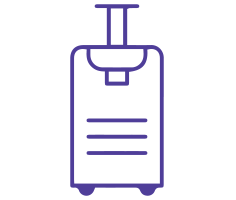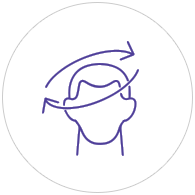- Private & confidential service
- Genuine medication
- All-inclusive service - No hidden fees
- Next day delivery
Motion Sickness
Start your consultation
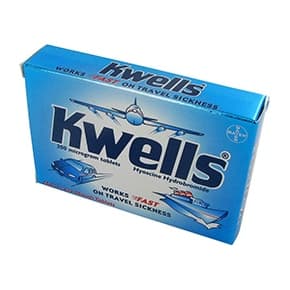
- Minimise motion sickness
- Continue your journey with ease
- Speedy recovery time
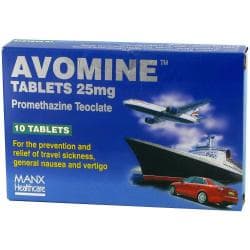
- Reduces motion sickness symptoms
- Speeds up the recovery time
- Promotes your natural body clock
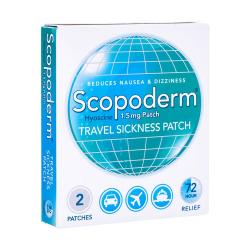
- Prevent motion sickness
- Minimise symptoms caused by travel
- For sea sickness, car, plane or train
Motion Sickness
Motion sickness - also referred to as travel sickness - presents a large inconvenience to many people. It is generally associated with travelling by car, but can also as a result of air or sea travel. During motion, the vestibular system of the body (which helps maintain a sense of balance) and the eye send mixed messages to the brain. This confusion results in the symptoms of motion sickness.
Topics
What is motion sickness?
An extremely common condition in the UK, motion sickness is caused by a series of movements your body is unfamiliar with and can also be referred to as travel sickness or, depending on the trigger, car-sickness, air-sickness or sea-sickness.
As your body isn't used to repeated motions - whether on a boat, in a car or even whilst playing a computer game - your brain becomes confused, resulting in various signals being transmitted throughout the body. This causes the unpleasant symptoms of motion sickness - headaches, sweating, nausea and vomiting - to name but a few.
It is important to note that although travel sickness can make you feel like you're going to be sick, you don't have to vomit to suffer from the condition. Travel sickness has the potential to be very debilitating, often affecting the independence of sufferers, therefore it is essential for those with the condition to seek appropriate help.
What causes motion sickness?
Triggers of motion sickness
Triggers vary on an individual basis, and only you will be the best judge of what personally affects your condition. For example, you may find you are fine on trains, but experience intense symptoms when at sea. It may be the longer the journey, the worse the effects.
 Coaches or car journeys
Coaches or car journeys Plane journeys
Plane journeys
 Boats or ships (in particular ferry journeys)
Boats or ships (in particular ferry journeys) Train journeys
Train journeys
 Attempting to read whilst travelling
Attempting to read whilst travelling Pregnancy
Pregnancy
Certain triggers, such as scents and tastes, can exacerbate the condition. Interestingly, those associated with travel can be the most intense. For example, the odours of petrol and diesel have been known to prompt symptoms.
How does motion sickness happen?
During motion, the vestibular system of the body sends messages to the brain to establish balance and movement. This is a highly complex network of nerves, channels and fluids in your inner ear which your brain can use to determine movement.
Motion sickness occurs when your brain cannot work at a fast enough rate to register all vibration and jolting while simultaneously processing your movement. This leads to the vestibular system becoming overwhelmed (this is why a rocky ferry trip can induce sickness even if the individual is not prone to motion sickness). This confusion results in the symptoms of travel sickness, as the motion your body feels is very different to the signals being sent by your brain.
Those who are more prone to travel sickness may have a more sensitive vestibular system that convinces your brain that you are completely still whilst travelling.
What are the symptoms of motion sickness?
Travel sickness can be very troubling for the chronic sufferer. You may experience several of the following symptoms, depending on your triggers and sensitivity:
 Dizziness
Dizziness Nausea
Nausea Vomiting
Vomiting
 Pale skin (face)
Pale skin (face) Cold sweat
Cold sweat Increase in saliva production
Increase in saliva production
Other symptoms may include headaches and migraines, drowsiness, fatigue and altered breathing patterns. Some may find that their motion sickness will subside, whilst others may feel unwell throughout the entire duration of a journey.
The symptoms of travel sickness can be disorienting and unpleasant at best, however there is treatment and certain methods that can be taken to minimise episodes of sickness.
How can motion sickness be treated?
Motion sickness is most effectively combated by using proven treatment methods at the time of sickness. The most popular forms of treatment can alleviate symptoms considerably. Whilst hyoscine and antihistamines are the most popular and clinically proven, they are best combined with self-help techniques.
Medication
Antihistamines
Many find antihistamines to be their preferred choice of medication, although they are not specifically designed for travel sickness. This makes them arguably less effective than hyoscine hydrobromide options available. At HealthExpress, we happily supply Avomine, a highly tolerable medication that can be safely taken by children in the correct dosage. Whilst you can only order medication online as an adult, you can obtain Avomine for your children after a doctor's appointment.
Hyoscine
The most effective medicine for motion sickness comes in the form of hyoscine and is available in a variety of formats, including patches and tablets. These work by intercepting the vestibular system's connection with the brain. When taken prior to travel - approximately 30-60 minutes beforehand - hyoscine is effective for up to 72 hours.
Hyoscine is a prescription medication that requires a doctor's consultation. This is something you can complete online today with HealthExpress. We offer two popular hyoscine brands, Kwells (tablet) and Scopoderm (tablet) to suit all needs and applications.
Home remedies
Whilst medication is the best way to avoid travel sickness, as it is clinically proven to be effective, you may also find certain home-remedies can help. It may be trial-and-error to find the best options for you, though you can always contact a medical professional for specific advice on treating your particular form of motion sickness.
- Ginger - The root of the ginger plant is believed to ease nausea, one of the most common, and most unpleasant, symptoms of travel sickness. Consider biscuits and cookies, drinks, natural tablets or even fresh ginger!
- Acupuncture - Travel sickness bands work by applying pressure to the inside of your wrist, and whilst they aren't proven, some people find them to help.
- Keeping hydrated - Drinking plenty of water or simple juices such as apple or orange can help to settle the stomach.
How can motion sickness be prevented?
If you're suffering from motion sickness, there are some tactics that can help:
- Distraction - Listening to your favourite band, podcast and audio book can all help to take your mind off nausea and other symptoms.
- Fixed glaze - Staring at a specific point in the distance, usually on the horizon, can help you eyes focus without often nausea-inducing movement of a book.
- Close your eyes - Closing your eyes can release pressure from your inner ears and help with sleep.
- Fresh air - Opening the windows of a car or heading to the deck of a ship for some fresh air can relieve feelings of nausea.
- Keep calm - Worry and stress can also be a trigger of motion sickness. Focus on steadying your breathing. This can be a welcome distraction from the condition.
- Keep still - Using a pillow or headrest to keep your head steady can help to prevent motion sickness.
- Find some stability - Placing your hands on a solid surface such as a table, wall or window can help you regain some sort of balance, alleviating the symptoms slightly.
- Eat well - Travel sickness may cause vomiting, regardless of whether you've eaten. Stick to a simple meal before you travel that will line your stomach, avoiding any fatty or spicy foods.
How to prevent sea sickness: infographic
Click on the below infographic to discover ways to prevent sea-sickness.
What motion sickness treatments are available?
We offer three motion sickness tablets; two in the form of hyoscine and one antihistamine. All three have been proven effective at alleviating the symptoms of motion sickness, and they can be taken with self-help and home remedies that you have found work for you.
Kwells is a hyoscine tablet that can be taken every 6 hours if needed whilst Scopoderm is a patch applied near the ear up to 5 hours before travelling. Our third option is the antihistamine Avomine that contains the active ingredient promethazine teoclate and is in tablet form. When taken 24 hours before a trip, many have found antihistamines to be suitable, however most head for the hyoscine options that are specifically designed to combat motion sickness.
3 simple steps to get you started












